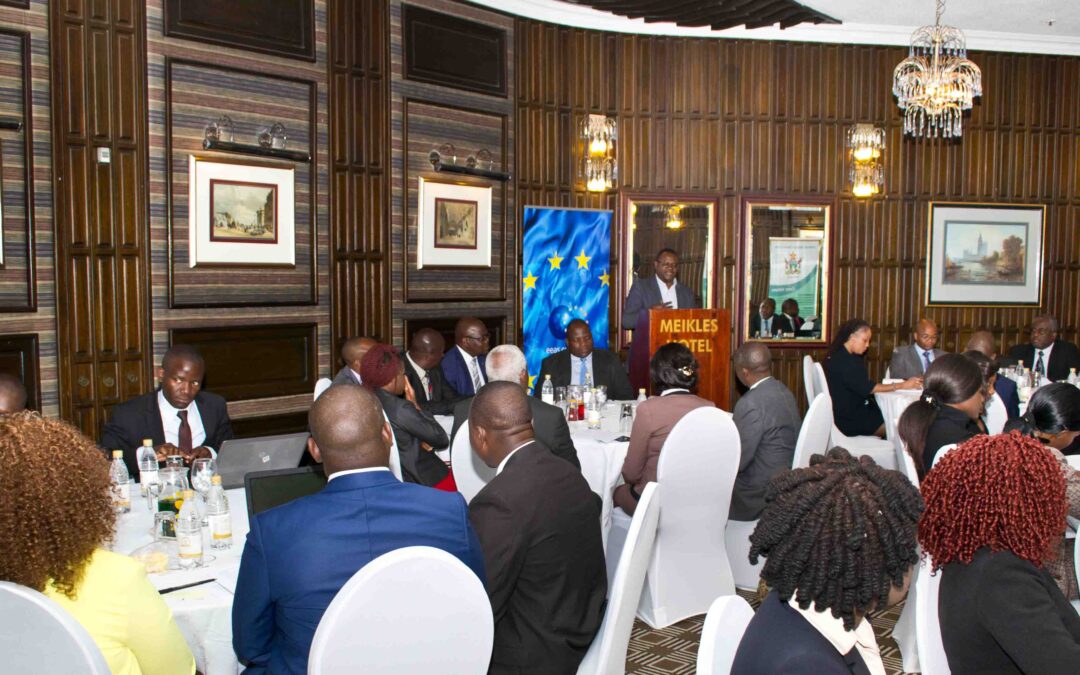
Aug 12, 2016 | News
The ICJ and the Judicial Service Commission of Zimbabwe (JSC) today held a one-day workshop in Harare to review the Magistrate Court Civil Rules.
Mr Chikwana, Deputy Secretary of the Judicial Service Commission of Zimbabwe, provided the opening remarks to the meeting.
He stated that the purpose of the review was to reconcile the procedural requirements in the courts with the provisions of the new constitution of Zimbabwe (2013).
Mr Chikwana mentioned that one of the objectives of the revisions was to create uniformity in the Rules of the different courts and in so doing make court processes simpler and more accessible to the general public.
Arnold Tsunga, ICJ’s Director for Africa, said that the whole idea behind the in-country activities carried out by the ICJ was to strengthen justice administration in Zimbabwe.
The workshop commenced with a presentation on an Overview of the current rules and feedback on input from Stakeholders by Justice Uchena.
Thereafter the delegates were assigned to groups to discuss the 34 Orders within the Rules of the Magistrate’s Court. After the 45-minute discussions, the groups presented their feedback.
The meeting was attended by judicial officers from the Constitutional Court, High Court and Magistrate Court; members of the legal profession, academia and civil society organizations.
Other notable attendees at the workshop include the Deputy Attorney General Nelson Dias and Mr Edward Mapara from the Law Society. There were 23 female and 24 male delegates at the workshop.
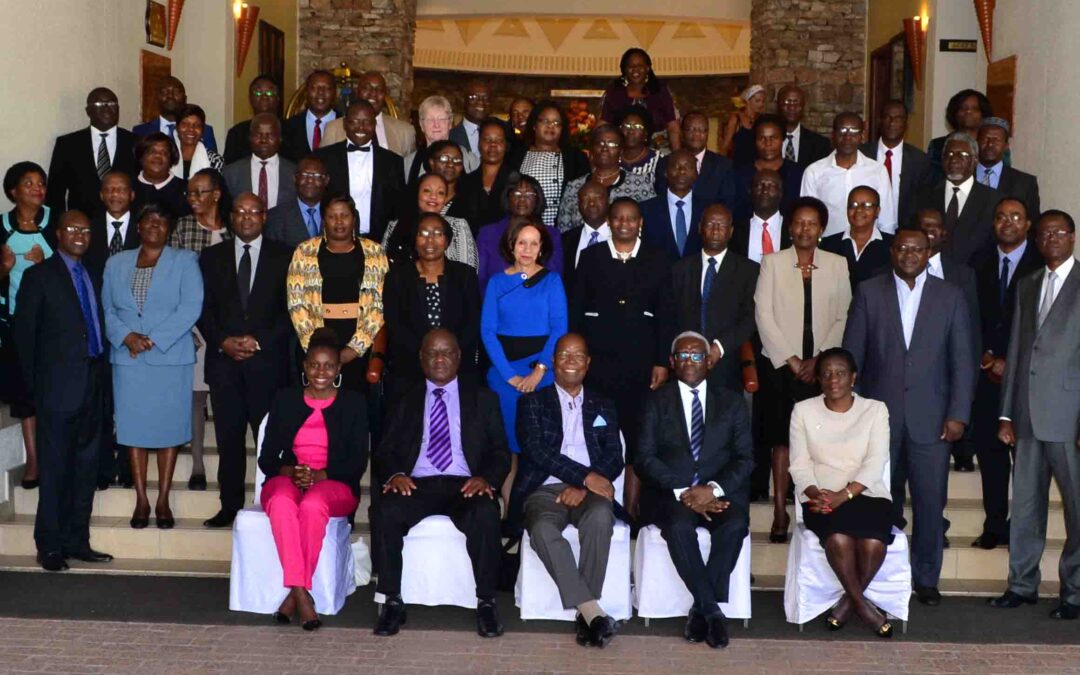
Jul 30, 2016 | News
The ICJ and the Judicial Service Commission of Zimbabwe, held a two-day Judicial Symposium for the end of the Second Term, at the Elephant Hills Hotel, Victoria Falls.
The subjects for discussion chosen by the judges reflect areas where judges felt the need for enlightenment.
In his opening remarks, the Deputy Chief Justice Malaba said that the purpose of this Symposium was to provide an opportunity for the judges to discuss and share ideas on the subjects chosen at the recreational environment.
The Symposium would serve to equip every judge with skills to feel confident in presiding over and disposing of cases fairly and expeditiously.
The former Chief Justice of South Africa Sandile Ngcobo delivered the keynote address which focused on Continued Judicial Education. Chief Justice Ngcobo stated that it was the collective responsibility of the judiciary to ensure it is sufficiently equipped to meet the demands of society and for the efficient dispensation of justice.
This would be achieved through continued judicial education.
Chief Justice Ngcobo was of the view that the importance of Continued Judicial Education lay beyond improving quality of justice but for the qualification of justice
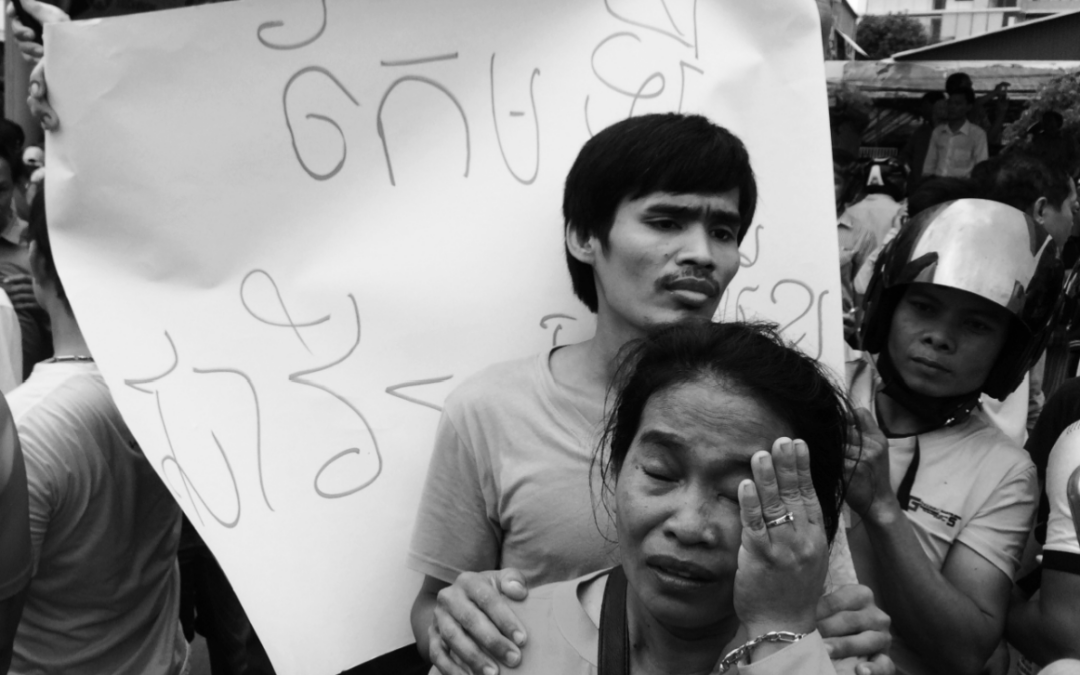
Jul 13, 2016 | News
The ICJ deplores the killing of Kem Ley, an outspoken human rights defender, political analyst and organizer of grassroots community activists, and calls on the Government to carry out a prompt, impartial and effective investigation to identify and bring to justice those responsible.
Shortly after the killing, Cambodian police arrested a suspect approximately two kilometers from the crime scene who “confessed” on a leaked video to killing Kem Ley for failing to repay a personal loan.
“Kem Ley, a prominent political commentator and human rights defender, was killed against a backdrop of escalating attacks on civil society and the political opposition,” said Kingsley Abbott, ICJ Senior International Legal Adviser.
“In the context of Cambodia’s long history of impunity in cases of allegedly politically motivated killings, and even though a suspect is already in custody, the authorities must continue the investigation in a transparent and methodical manner until all potential lines of inquiry have been exhausted,” he added.
There are already concerns about certain events that took place immediately after the killing which may have harmed the investigation.
For example, shortly after news spread of Kem Ley’s death, the authorities observed a large crowd gather in and around the courtyard of the petrol station in which he was killed, potentially compromising important sources of evidence from this wider area and the vehicles within it.
The large gathering effectively served to block medical vehicles from removing Kem Ley’s body from the scene, which may have prevented a forensic autopsy from taking place.
Later the same afternoon a large procession accompanied his body from the crime scene through the streets of Phnom Penh to Wat Chas pagoda, where his body remains lying in wake.
“Where it lacks capacity, Cambodia should seek technical assistance from States and international organizations particularly in the specialized areas of Closed Circuit Television (CCTV) and telecommunication data analysis which may assist in establishing the identification and movements of the perpetrator and whether he or she acted alone or with others,” Abbott said.
The ICJ calls on the Cambodian authorities to:
1. Ensure that the investigating judge and investigators are – and are seen to be – impartial and independent of undue influence, and are free to perform their professional functions objectively without intimidation, hindrance, harassment or improper interference.
2. Ensure that the investigation process and its outcome are transparent and open to scrutiny by the victims and the general public.
3. Protect the rights of the victims including by ensuring Kem Ley’s family:
- receive regular information about the progress of the investigation and their rights;
- receive all necessary support and assistance; and
- are protected from any ill-treatment, intimidation, or sanction as a result of their participation in the investigation.
4. Protect anyone who provides information to the authorities from ill-treatment, intimidation or sanction.
5. Actively seek out and accept offers of assistance from States and international organizations including in the areas of:
- the analysis of any CCTV and telecommunication data; and
- the forensic examination of Kem Ley’s body, crime scenes and vehicles.
Background
At approximately 0830 on 10 July 2016, Kem Ley was shot and killed at a petrol station cafe on Phnom Penh’s Monivong Boulevard. Shortly afterwards, the authorities apprehended a man nearby in connection with the killing who identified himself as “Chuob Samlab”.
On a leaked video, the man reportedly “confessed” to the killing claiming he shot Kem Ley over a debt the political commentator allegedly owed him, a fact reportedly disputed by Kem Ley’s widow and the suspect’s wife.
Under Article 12 of the United Nations Declaration on Human Rights Defenders, States are required to take all necessary measures to ensure the protection of human rights defenders against any violence, threats, and retaliation.
Contact:
Kingsley Abbott, ICJ Senior International Legal Adviser for Southeast Asia, t: +66 94 470 1345 ; email: kingsley.abbott(a)icj.org
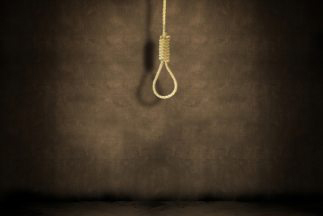
Dec 2, 2015 | News
The ICJ today denounced the execution of four individuals convicted for their involvement in terrorism in secret trials by military courts.
Four civilians, namely Maulvi Abdus Salam, Hazrat Ali, Mujeebur Rehman and Sabeel alias Yahya, were hanged in Kohat early morning today after being sentenced to death by military courts earlier this year.
In a press statement issued on 13 August, the media wing of the armed forces announced they were convicted for their involvement in “terrorist activities”, including harboring, funding and transporting “suicide bombers” who attacked the Army Public School in December last year.
According to the statement, they are all “active members” of the “Toheedwal Jihad Group”.
The ICJ considers that the executions are unlawful, in breach of Pakistani law and its international legal obligations.
“The failure of the government and military authorities to make public information about the time and place of their trials, the charges and evidence against them, as well as the judgments of military courts have confirmed fears of human rights groups and the legal community that military trials in Pakistan are secret, opaque and constitute a violation of the right to a fair trial,” said Sam Zarifi, ICJ’s Asia Director.
The ICJ emphasizes that under international standards, civilians may not be tried before military tribunal.
As highlighted by the ICJ in a briefing paper released in April, proceedings before Pakistani military courts fall well short of national and international standards requiring fair trials before independent and impartial courts: judges are part of the executive branch of the State and continue to be subjected to military command; the right to appeal to civilian courts is not available; the right to a public hearing is not guaranteed; and a duly reasoned, written judgment, including the essential findings, evidence and legal reasoning, is denied. In addition, the procedures of military courts, the selection of cases to be referred to them, the location and timing of trial, and detailed about the alleged offences are kept secret.
“The ICJ supports the pursuit of justice for all victims of terrorism in Pakistan, including the horrific attack on the Army Public School last year”, added Zarifi. “However, justice will not be done by subverting the foundational pillars of justice: the right to a fair trial and independence of the judiciary.”
The UN Human Rights Committee, the supervisory authority for the ICCPR, has emphasized that in trials leading to the imposition of the death penalty, “scrupulous respect of the guarantees of fair trial is particularly important” and “imposition of a sentence of death upon conclusion of a trial, in which the provisions of article 14 of the Covenant have not been respected, constitutes a violation of the right to life.”
Pakistan has hanged more than 300 people since it lifted a six-year moratorium on the death penalty in December 2014. Initially lifted only for terrorism-related offences, the Government resumed executions in all cases in March 2015. Less than ten per cent of the total executions relate to terrorism-related offences.
“These executions only fulfill a desire for retribution and add to the disturbing trend of hanging people in the name of fighting terrorism in Pakistan and the region,” said Zarifi. “The death penalty has not been shown to have any deterrent effect on crime or terrorism anywhere in the world.”
The ICJ opposes capital punishment in all cases without exception. The death penalty constitutes a violation of the right to life and the right not to be subjected to cruel, inhuman or degrading punishment.
In December 2014, the UN General Assembly adopted a resolution, for the fifth time since 2007, emphasizing that the use of the death penalty undermines human dignity and calling on those countries that maintain the death penalty to establish a moratorium on its use with a view towards its abolition.
Some 117 UN Member States, a wide majority, voted in favor of a worldwide moratorium on executions as a step towards abolition of the death penalty.
In line with the present international trend, the ICJ reiterates its call on Pakistan to impose an official moratorium on executions, with a view to abolishing the death penalty.
Contact
Sam Zarifi, ICJ Asia Pacific Regional Director (Bangkok), t: +66 807819002; email: sam.zarifi(a)icj.org
Reema Omer, ICJ International Legal Adviser for Pakistan (London), t: +447889565691; email: reema.omer(a)icj.org
Additional Information
On 6 January 2015, less than a month after a terrorist attack on an army public school in Peshawar that killed nearly 150 people, most of them children, Parliament voted to amend the Constitution of Pakistan, 1973, and the Army Act, 1952, to allow military courts to try civilians for offences related to terrorism.
Since January 2015, 56 cases have been referred to military courts, out of which 31 have been decided. Military courts have found the accused persons guilty in all cases. 27 convicts have been given the death penalty and four have been sentenced to life imprisonment.
Around 20 cases are still pending before the various military courts.
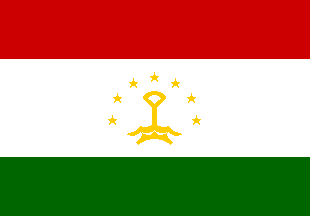
Oct 1, 2015 | News
The ICJ is alarmed at the arrest of Buzurgmehr Yorov, a lawyer practicing in Tajikistan.
Mr Yorov’s arrest may be related to his representation of thirteen leaders of the Islamic Renaissance Party of Tajikistan (IRPT).
This is the third recent case of arrest of a lawyer in Tajikistan, and this pattern of arrests raises serious concerns for protection of human rights and compliance with international standards on the role of lawyers.
On 28 September, at 10.00, police officers appeared at the “Sipar” Collegia of lawyers, which is headed by Buzurgmehr Yorov, and seized documents related to the case of the members of the IRPT who Mr Yorov represents. At around 14.00, other police officers apprehended the lawyer at his office, claiming he needed to answer certain questions. The lawyer later made a phone call to say that he had been arrested and detained.
On 29 September, the Ministry of Interior of Tajikistan, in its Press Release, said that Buzurgmehr Yorov “by way of fraud” appropriated “a large amount of money”.
According to the Ministry of the Interior, a resident of Istaravshan named Komiljhon Bozorov paid USD 4000 to help with the case of his son, who was charged with an attempted murder. Mr Bozorov is reported to claim that the lawyer failed to provide legal aid and “abused his trust and his difficult situation”.
Mr Yorov is also charged with forging documents about the technical condition of a car.
The ICJ fears that the decision to arrest lawyer Buzurgmehr Yorov was in fact connected with his representation of members of the IRPT.
The ICJ recalls that according to the UN Basic Principles on the Role of Lawyers, “Lawyers shall not be identified with their clients or their clients’ causes as a result of discharging their functions”; they must be able “to perform all their profession functions without intimidation, hindrance, harassment or improper interference”; and lawyers “shall not suffer, or be threatened with, prosecution or administrative, economic or other sanctions for any action taken in accordance with recognized professional duties, standards or ethics”.
The ICJ’s concerns in this case are based in part on the particularly worrying pattern of arrests of lawyers , who represent clients in “high profile” cases, that has emerged in the recent past in the Republic of Tajikistan.
It should be recalled that it is lawyers’ role to defend persons charged with alleged crimes. The justice system cannot function in accordance with international standards if lawyers are not able to represent their clients’ interests.
For the right to a fair trial as guaranteed under international human rights law to be protected, defendants must have access to a lawyer who can represent their interests effectively, without harassment or interference.
The ICJ calls on the authorities of Tajikistan to ensure that all lawyers are able to conduct their work without fear of threats or harassment, including arbitrary arrest or prosecution.
It calls on the investigating authorities to ensure that Burzurgmehr Yorov is not prosecuted as a means of harassment or reprisal for his representation of a client, and that any proceedings against him are conducted in accordance with international human rights law, including the right to a fair hearing, and taking into account international standards on the role of lawyers.
Whether or not his arrest is in reality based on his representation of IRPT, or on the basis of the allegations of fraud, Mr Yorov should be immediately released.
Even if the arrest was in fact based on the allegations of fraud, the ICJ is unaware of any evidence or reasons in Mr Yorov’s case that would justify his continued pre-trial detention, under international standards on the right to liberty and the prohibition of arbitrary arrest and detention.
Background information:
Thirteen persons, represented by Burzurgmehr Yorov, were arrested on 16-17 September 2015, following armed attacks earlier this year in Dushanbe and Vakhdat.
Members of the group are accused of “establishment of a criminal community/organization in order to commit grave or particularly grave crimes”, as foreseen under Article 187(1) of the Criminal Code of the Republic of Tajikistan.
The arrest and detention of Mr Yorov is the third case in the last two years of prosecution of a lawyer representing clients in a high profile case in Tajikistan. On 13 January 2015, lawyer Shukhrat Kudratov was convicted to 9 years in prison on charges of fraud and bribery.
In 2014, another lawyer, Fakhriddin Zokirov, was arrested and tried on charges of fraud in banking transactions. He was released as a part of an act of amnesty in November 2014.
Tajikistan-Lawyer Yorov statement-News-web stories-2015-RUS (full text in Russian, PDF)
For further infromation see previous ICJ statements:
Tajikistan: ICJ concerned at conviction of lawyer Shukhrat Kudratov
Tajikistan: Arrest of lawzer is a threat to the independence of the profession









